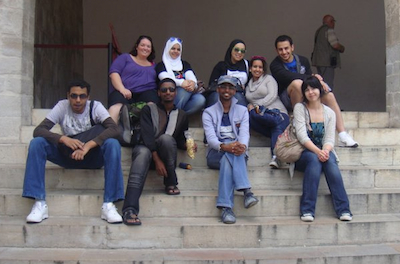Students Join Research Project to Preserve Local Lore
May,2011

Watts (lower right) and student researchers in Lisbon, Portugal.
Four WCMC-Q student investigators recently traveled to Lisbon, Portugal, to present their research in progress at the Societé Internationale d´Ethnologie et de Folklore (SIEF) conference. The conference, held every four years, drew more than 900 anthropologists, ethnologists, folklorists and others interested in storytelling and its social impact.
The student research team—comprising four WCMC-Q students and five Qatar University students—spoke about their project, entitled “Voices of Memory: Oral Stories and Folktales of Qatar,” involving the discovery, transcription and translation of local lore, and one of the most comprehensive efforts of its kind to date in Qatar.
“I was researching Qatari folktales and found that there were no English collections,” said Autumn Watts, MFA, writing lecturer at WCMC-Q and faculty lead on the study. “We want to see what is out there and provide quality English translations.”
The study, involving WCMC-Q students Hiba Al Ashtal, Yasser Al Samman, Mei Elghindi and Rana El Maghraby as well as Qatar University students Tariq Ahmed, Hind Al Sowaidi, Kholoud Saleh, Majdelden Mohamed and Mazin Mohamed, will include at least 27 stories when complete, comprising a bilingual English and Arabic anthology. Faculty from WCMC-Q, Ian Miller, MFA, writing lecturer, and Watts join Amy Hamar, an English instructor at QU to oversee the study.
While translating stories from one language to another might seem commonplace, this project presents extra challenge in terms of interpreting Arabic across the many Qatari and regional dialects and decoding ideas from their Arabic context into meaningful English equivalents, Watts explained. Furthermore, students will be challenged to take a living, dynamic oral performance and translate it effectively into a written text.
“These stories are organic and passed down through families so of course they change along with the storyteller and the way that it’s performed, that’s as important a part of the folktale as the story itself,” Watts said. “ Folktales are living documents, they’re organic and they’re shifting.
When you take something and you record it and translate it,” she continued, “you are detaching it from that context—it’s like someone saying ‘I want to preserve my hand so let me cut it off and stick it into formaldehyde … that way it will stay that way forever.’ The best way to preserve these stories is to keep them alive, to keep retelling them.”
A doctor’s ability to respond effectively to patients depends on interpreting their described conditions, lifestyles and family histories. Thus this folklore study—requiring listening skills, social sensitivity, and learning how to build rapport—offers many useful skills to medical students involved. The students additionally gained much insight from presenting at an international conference.
“We presented our work to people who didn't even know what or where Qatar was,” said Rana El-Maghraby, a pre-medical student at WCMC-Q and member of the research team. “We met people from totally different backgrounds and got to know more about their unique research, and this experienceencouragedus to work more on the project so we can share it with other people.”
As a social research project, the study contributes much to the understanding of life in Qatar and how many peoples and traditions have influenced its culture over time.
“This project gives a lot of insight into Qatar,” Watts said. “These are stories that contain moral values. They’re also teaching tools as they are intended for different ages; for instance, in some families, some stories are only told to women after they are married.
“As an English speaker, I think they’re wonderful,” she continued. “ I’ve found them fantastic—they illuminate the culture and give insight into the history. Some of these stories contain details that are not indigenous to Qatar, like grasslands, wolves and lakes, and this reflects a past for families who didn’t originate here, they came from somewhere else.”
By Emily Alp
